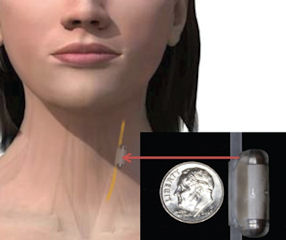A Valencia biomedical company has received a major financial spark. SetPoint Medical received $27 million this month following a successful clinical trial of its bioelectronic treatment for rheumatoid arthritis. Prior to the latest round of funding, the company had raised only about $14 million since its 2007 founding. The company is developing a novel treatment that involves implanting a tiny device that stimulates nerves with electricity and produces an anti-inflammatory effect. Several firms contributed to the recent round of funding, with a notable $5 million coming from a new bioelectronics venture capital fund started by Brentford, England drug company GlaxoSmithKline plc. SetPoint represents the first investment by the new fund. “This really helps elevate us in the market,” said Anthony Arnold, chief executive of SetPoint. “This funding will help us prove beyond any reasonable doubt that the treatment we’re confident in is truly beneficial.” The treatment was developed by company co-founder and neurosurgeon Kevin Tracey, who is president of the Elmezzi Graduate School of Molecular Medicine at Hofstra North Shore-LIJ School of Medicine in Manhasset, N.Y. In addition to Glaxo, SetPoint’s new investors include Natick, Mass. medical technology company Boston Scientific Corp. and Mansfield, Mass. medical investment firm Covidien Ventures. Ahmed Enany, chief executive of L.A. trade group Southern California Biomedical Council, said the technology Setpoint is developing is an emerging field in the industry. “The kind of technology they are working on will allow major intervention into inflammatory diseases,” he said. “The work they are doing is significant.” SetPoint previously received funding from Cleveland private equity firm Morgenthaler; Norwalk, Conn. health care venture capital company Foundation Medical Partners; and Roslyn Heights, N.Y. venture capital firm Topspin Partners LBO. SetPoint was founded in 2007 by Tracey, a New York neurosurgeon, about seven years after he initially published his research in the medical journal Nature. He is listed as “scientific co-founder” of the company. Tracey could not be reached for comment, but Arnold said the initial discovery came during brain surgery, when Tracey found that stimulating a nerve in the brain was reducing inflammation elsewhere in the body. SetPoint’s treatment implants a tiny device in the neck, where it stimulates the vagus nerve, which runs from the cranium through the abdomen. Valley ties Arnold joined the company in 2010 and was named chief executive in late 2011. He previously worked at Advanced Bionics, a maker of cochlear ear implants, and MiniMed, a maker of insulin pumps, when they were owned by billionaire entrepreneur Alfred Mann. SetPoint began first human trials in Europe between late 2011 and mid-2012. Out of the eight humans tested, Arnold said three reported significant results as calculated by a reduction in joint swelling and the patients’ reported reduction in pain. Arnold said the number is considered a successful result in the industry. “It couldn’t have been better across the board,” he said. “I think what helped people want to invest is that we did very well in those trials.” SetPoint currently has six full-time employees, in addition to outside contractors and consultants. Glaxo seeded its Action Potential Venture Capital fund with $50 million. In its press release about the investment, GlaxoSmithKline called SetPoint’s research “highly novel and potentially transformative.” “GSK can play the integrating role that is needed to drive this new type of medical treatment all the way from the bench to the patient and this fund is a key part of our efforts,” said Moncef Slaoui, chairman of research and development at GlaxoSmithKline Biologicals, in a statement. Arnold hopes the most recent investment will help pay for larger rheumatoid arthritis clinical trials that could allow the device to enter the U.S. market. However, Enany said the amount of funding will likely be insufficient given the difficulty in obtaining Food and Drug Administration approval. “This funding will be sufficient for a couple of years, but then they’ll have to go back to the market to get more,” he said. “But this is a hot company with hot technology. They should be able to keep getting more money.” Arnold said the company also is in the process of designing trials focused on inflammatory bowel diseases such as Crohn’s Disease. “If this thing does what I believe it does, it stands to be one of the biggest opportunities in medical devices in years,” he said. “It can really change the way we treat patients.” Still, there is no true cure for rheumatoid arthritis. It and other inflammatory ailments, including Crohn’s, are usually treated with over-the-counter nonsteroidal anti-inflammatory drugs, such as Aleve, or prescription immunosuppressant medications such as Imuran, which is made by GlaxoSmithKline. Arnold said the technology SetPoint is working on could save substantial money compared to a lifetime of medication, which might cost an insurer $30,000 annually for each rheumatoid arthritis patient. Arnold said the total cost, from the price on the device to the surgery and the post-surgical management, could run between $50,000 and $60,000 once costs are brought down. “In less than two years, conservatively, this therapy will pay back to the payer,” he said. “It’s a while before it makes a big difference, but it’s exciting what this could mean for patients and the health care system.”
